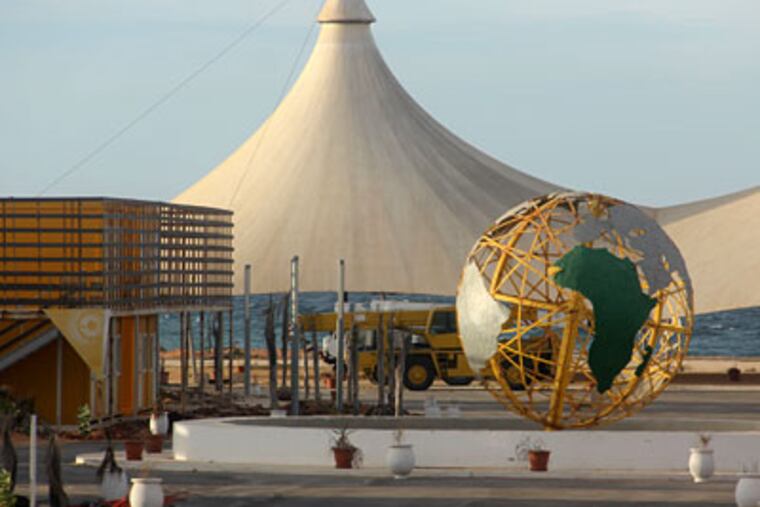In Africa, pondering its history and future
Senegal, the site of two visits, has been stable, but political change buffeted other nations in the region.

DAKAR, Senegal - This is Africa, the place where human history began and where the new world order is evolving.
Twice I've stood in Senegal, on the eastern edge of the Atlantic Ocean, meeting people and sharing experiences that make me understand my own family history and black history much better. Each trip, first in December 2010 for the World Festival of Black Arts and Culture and now this past December with the World Summit of Mayors, has made me want to go deeper - to explore more, to learn more, and to understand more about this continent and our world.
"What I have learned is that we all have basically the same concerns," said Michael Blunt, mayor of Chesilhurst, a delegate from the National Conference of Black Mayors who attended the Dec. 15-19, 2011 meeting of 250 mayors of African descent in Dakar. The sessions were a joint effort of the National Conference of Black Mayors, the National Association of Senegalese Mayors, and the Joint United Nations Program on HIV/AIDS (UNAIDS).
In the year between my two visits to Dakar, African nations have been part of the democratic change that is sweeping the world. On my first trip, we sat at the foot of the African Rennaissance Monument just a tent away from Africa's first and only female president, Ellen Johnson Sirleaf of Liberia. We saw Libya's Moammar Gadhafi enter a youth rally in December 2010 like a rock star. He died of a bullet to the head just 10 months later, his country in turmoil.
Political change also erupted in Egypt, the most populous country in northern Africa, where protests led to the ouster of its president, Hosni Mubarak.
And on my second visit to Dakar, the air seemed to crackle with tension as presidential elections were set to start within days. We wondered whether this nation would remain the only country in mainland West Africa to have escaped a coup since the end of its colonial era.
The Senegalese awaited the list of presidential candidates in late December and news of whether democratically elected President Abdoulaye Wade, 85, would seek a controversial third term, extending what his opponents consider a two-term limit. Wade filed for reelection and remains on the Feb. 26 presidential ballot. In two short months, the list of his challengers had grown to include world music star Youssou N'Dour and 13 other rivals. N'Dour's candidacy was invalidated, but he vowed to work for the election of a new president this month. "We will never allow Abdoulaye Wade to take part in the election," he said, speaking on his own TFM television channel in late January.
Thinking about the highly charged political climate and electoral process in the United States now, I realize we may have more in common with the Senegalese people than we realize.
The goal of the mayors' summit, said NCBM president Robert Bowser, mayor of East Orange, N.J., who led the U.S. delegation of about 30 mayors, was to find those common areas of understanding. It did not stray into the political destiny of the countries invited to the events, but rather lauded common solutions to problems faced by the African diaspora.
One of those problems is the need for education. While there, we had 11 hostesses, young women who were students at the universities, learning to speak English by assisting us. They reminded me of my own daughter, a teacher studying at the University of Pennsylvania who's particularly concerned with girls' educational achievements.
I know from my daughter that one of the practical barriers to education is simply supplies: You can't practice math problems if you don't have a pencil. Before I left Senegal, I gave a backpack full of school supplies to two of our hostesses and we traded e-mail addresses. I heard from one of the students last week; she wanted me to know she still thought of me. "I hope you are well," she wrote. I hope that she keeps up her studies and becomes part of the new and more economically empowered Africa.
What I have learned from Dakar is that our history, whether it is black or global history, is being written and rewritten every day. Black History Month is not confined to the 28 or 29 days of February; it expands beyond our borders and our (often limited) vision of the African diaspora.
It is being written every day and we are a part of it.
Every time I visit Africa, I discover new places - new people - and a changing destiny. I can't wait until next time.